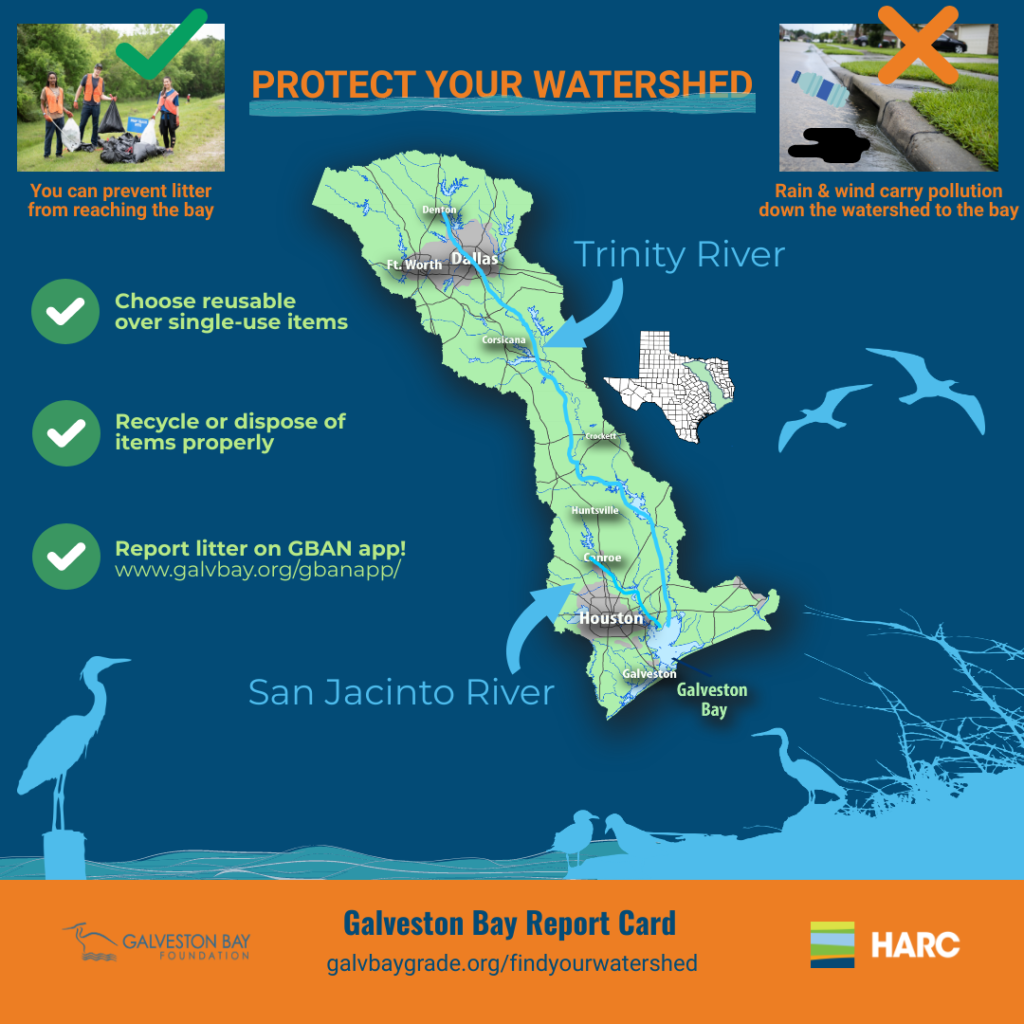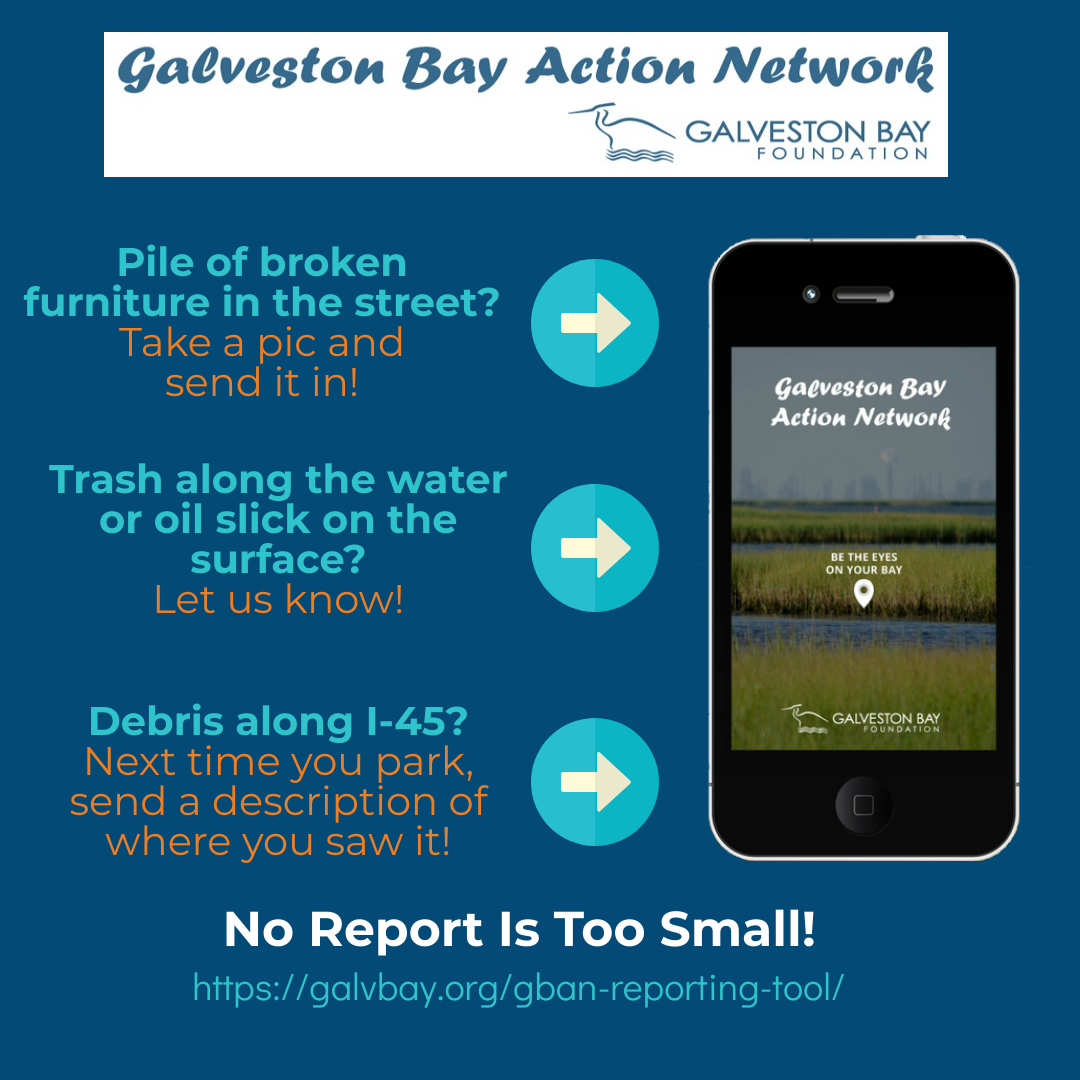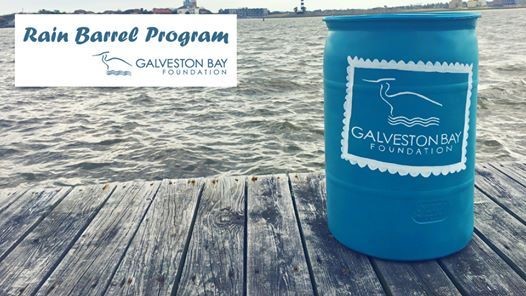With more people staying at home these days, more people are realizing the importance of the bits of nature in their neighborhoods. Galveston Bay Foundation has received more questions than usual about how to reduce trash, save water, and help water quality in different communities. This is great news! It means people are noticing how connected all our backyards, pocket parks, street drains, and local rivers are to Galveston Bay. The bay does start in your “backyard”, whether that means an actual yard, home driveway, apartment sidewalk, the drains on your street, or a nearby patch of grass. Your backyard is whatever is outside where you live or play. If that is within the Galveston Bay watershed, which covers Dallas/Fort Worth, Houston, and all the way down to Galveston, it impacts the bay. Luckily, there are plenty of resources to help you protect your “backyard” and the bay. Many of these options help you save money too!

1) Make sure plants in your green spaces are bay-friendly! If you have plants in your yard or your apartment complex, challenge yourself to find out if they are native or invasive. Native plants require less water, fertilizers, and pesticides. This saves you money and keeps more fresh water in our rivers and harsh chemicals out of our waterways. Also, excess nutrients from fertilizers used in the spring contribute to low oxygen zones along our coast every summer, causing fish to die off in large numbers. Use the free iNaturalist app to identify any plant or animal you can get a photo of and find out if it’s invasive. Remove invasive plants or contact your apartment complex to request they use native plants to protect the local environment.
2) Pick up litter and report pollution in your neighborhood. Any litter on the ground in our watershed is likely to end up in Galveston Bay, by being washed down storm drains, into connected streams, or blown by wind. Pick up litter when you see it, secure your trash and recycling, and report pollution through the free Galveston Bay Action Network (GBAN) app or website. The GBAN app automatically sends your report to the correct authority to clean it up! See a pile of trash on your street, oil slicks or dead fish in your local stream? Report it in just a few minutes.

3) Keep cooking grease and oil out of your pipes. Putting stuff like bacon grease or cooking oil down your drain may seem like the best option but it will clog your pipes, leading to expensive repairs later, and contaminates the bay. It’s best to scrape it into a jar and use it for cooking later or throw it away when your jar is full. You can also recycle cooking oil for use as Biodiesel! Check out this website to learn how to Cease the Grease and where you can recycle it.
4) Save money on your bill by conserving water. Turning off the tap while you brush your teeth or wash your hands is an easy way to save water and money! You can also install barrels to catch rainwater in your yard. Galveston Bay Foundation offers rain barrels, everything you need to hook them up, and online instruction for only $35 per barrel! If you rent, ask your landlord or apartment manager about using rain barrels to save money and water usage. They’re great for watering lawns and plants all year long. You can find out about upcoming Rain Barrel Workshops here.

5)Learn how much water your yard really needs with the Water My Yard app. The Harris-Galveston Subsidence District has installed six climate stations throughout the Greater Houston Area that transmit real-time climate data to Texas A&M University (TAMU) researchers. Using these and other local weather stations, rainfall data is used to estimate how much water your yard needs at any given time. The Galveston Bay Foundation was awarded funding from the Environmental Protection Agency (EPA) to update the Water My Yard program. Download the free app or use the website, and feel free to provide feedback on how to make it even better. One fan of the app said “I suspect I have saved hundreds of dollars on my water bill since starting the service last July in addition to the environmental contribution of reduced draw from a city system primarily drawing well water.”
6) Keep your family and the bay protected at play. Check up-to-date water quality reports at your favorite swimming spot on the Swim Guide or Texas Beach Watch websites. Take your trash with you if trash and recycling cans are not nearby or are full. If you are boating, make sure to Pump, Don’t Dump your boater waste, and keep propellers away from underwater grass areas.
For more information on water quality and conservation, visit Galveston Bay Foundation’s website.
To find personalized suggestions on other ways to help the bay based on your interests, check out the What You Can Do tool!